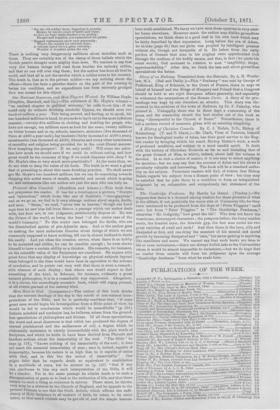Man Next to God. (Longmana.)—The author of this book thinks
that the current theology of the day is the rosult of non-natural inter- pretations of the Bible, and he is perfectly confident that, "if some great man would begin his investigations from is Bible point of view, he would be led to conclusions which would be unassailable " (p. 124). Infinite mischiof and confusion has, he believes, arisen from the ground- less speculations of philosophers and divines. Of all those speculations, the worst and most disastrous is that which has produced the dogma of eternal punishment and the endlessness of evil, a dogma which he elaborately maintains is utterly irreconcilable with the plain words of Scripture, and which he holds to have been derived from Platonic and heathen notions about the immortality of the soul. " The Bible " he says (p. 118), "knows nothing of the immortality of the soul ; it does not teach the essential immortality of man ; man is, indeed, capable of immortality, because his nature is so high that he is capable of union with God, and in this lies the secret of immortality." One might infer that he regards death as equivalent to annihilation in a multitude of cases, but ho assures us (p. 130) "that if any one attributes to him any such interpretation of the Bible, it will be a slander. Yet in tho same passage be admits death to be such a disorganization of parts as to lead to the extinction of life, and that there Cannot be such a thing as existence in misery. There must, he thinks, very soon be a division in the Church of England, and ho appeals to the present Primate to see that the Sixth Article, which affirms the suffi- ciency of Holy Soripturo in all matters of faith, be taken to its strict letter, so that man's rubbish may be got rid of, and the simple heaven- born truth established. We fancy we have seen these opinions in very simi- lar forms elsewhere. Howevor much the author may dislike groundless speculations, we think there is a good deal in his own book which may be fairly described by that expression. Long before the era of Adam, he thinks (page 65) that our globe was peopled by intelligent persons without sin, though not incapable of it. He infers from the early portion of Genesis that man in his original state apprehended God through the medium of his bodily senses, and that, in fact (we quote his oxact words), God assumed in relation to man " tangibility, shape, apprehendability." After this, we think the less said about groundless speculations the better.


































 Previous page
Previous page